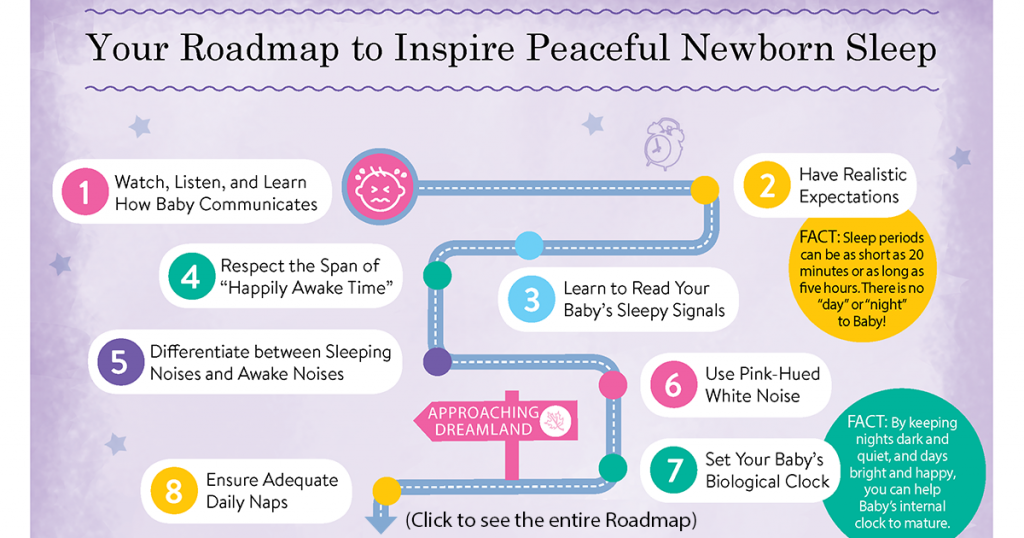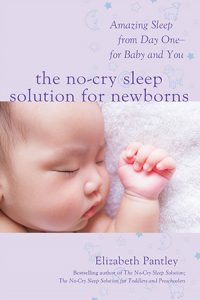What is the number one issue among parents of babies? Sleep!
We wanted to talk to someone who has spent many years helping parents with infant sleep issues, so we interviewed Elizabeth Pantley, who has written the No-Cry Sleep Solution series of books. Her new book, The No-Cry Sleep Solution for Newborns, was released in October 2016.
1) How did you get started in sleep research?
My fourth baby propelled me into sleep research because as a year old he was still waking up to breastfeed every few hours all night long, every night. People told me I had two choices: to live with it, or to let my baby cry-it-out. I certainly wanted – and needed – my sleep, but I was adamantly against letting my baby cry to sleep. I thought it was a cruel and heartless way to treat the tiny, innocent, trusting little love of your life.
Now infants can get
all their vitamin D
from their mothers’ milk;
no drops needed with
our sponsor's
TheraNatal Lactation Complete
by THERALOGIX. Use PRC code “KELLY” for a special discount!
But, as a busy author and mom of three other children I was a walking zombie! I desperately needed to find a way to help us both sleep better – ways that were respectful to my baby and that did not include crying. I launched myself into research and gathered a group of test parents with non-sleeping babies to be my test cases – and The No-Cry Sleep Solution was born. That book is now ten years old and available worldwide in 27 languages – clearly sleep is a critical topic for all families.
Twenty months ago my oldest child had my first grandbaby – and I learned the joys of being “Nana.” This new life reminded me how hard it is to care for a newborn, and I realized that I had a wealth of sleep knowledge to share which would make these early months much more relaxed and peaceful for babies and their parents, and so The No-Cry Sleep Solution for Newborns was born soon after my first grandchild!
In the book you mention you have worked with thousands of new parents. Could you tell us a little more about your research for this book?
Sleep, or more accurately, lack of sleep is the number one issue among parents of babies. As an author of four books specifically on the topic of sleep you can bet my inbox is daily filled with letters from sleepless parents needing help! When I begin work on a new topic I gather a group of families to get their input, ideas, and questions. I have found that the best way to use all the valuable research that exists is to put it to use in the real world, with real families. The combination of research and real life is what makes ideas and solutions usable for families.
2) Some parents say their baby wakes constantly; others say they sleep for hours at a time. What are the ranges for normal night time sleep patterns in newborns?
It’s something we adults seem to overlook – just as we all sleep differently from each other, so do our babies. There are many factors that affect how a baby sleeps, and there is a wide range of normal. Even still, there are similarities that we should consider. Newborn babies will sleep 15 to 18 hours out of every 24, and about 6 to 8 of those hours will occur as daytime naps – if we understand and respect their sleep needs. If we don’t understand their needs they won’t sleep well – and this is a very common problem. If we don’t help them get the sleep they crave they can become agitated, and fussy – and this further prevents them getting the sleep they need. That’s why it’s important to learn what’s normal for a newborn and help your infant get the sleep he needs.
One of the most important keys to good newborn sleep has nothing to do with sleep hours and more to do with awake times. Newborns can only stay happily awake for forty-five minutes to an hour or two at a time. If they are routinely sleeping well at night and getting good, long naps, then by six months most babies can stay awake for two to three hours. However, all newborns do best with short awake spans interspersed with plenty of naps. If your baby has been awake beyond this ”happily awake span” you have likely missed some sleepy signals, and your newborn is overtired. An overtired baby will be fussy and find it hard to sleep, yet won’t be able to stay happily awake, either.
3) Let’s go to the question that many new parents want to know: When will their child begin to sleep through the night?
This is the most common question about babies and sleep! The problem here is the perpetuation of the myth that babies should sleep independently through the night from the time they are a few months old. Sure, a handful of babies do sleep through the night from the start (One of my four was one of those unicorn babies!) but most do not. Sleep patterns, and the ability to sleep all night, have a powerful biological foundation. We can affect this somewhat with routines and our actions, but just like your child’s eye color, height and the amount of hair on her head, much of your child’s sleep patterns are out of your control.
Babies have immature sleep systems. They have very tiny tummies – only about the size of a cherry at birth! Babies grow rapidly, their liquid diet digests quickly. During those early months, your baby will have tremendous growth spurts that affect not only daytime feedings, but nighttime feeding needs as well.
This means that it is perfectly natural, absolutely normal, and totally expected for your baby to wake up in the night and need nourishment or your help to fall back to sleep. Sleeping all through the night, every night, without needing a parent’s assistance, is like learning to walk or talk or drink from a cup — all kids get there, but they do so at their own speed, a little bit at a time, and in their own unique way.
4) You discuss the need to learn your baby’s sleep cues. Why is that important?
Your baby will give you signs when she is tired. Reading these sleepy signals correctly is critically important, and will affect the results of every other sleep solution you use. If you miss the window of tiredness, your baby will quickly become overtired. An overtired baby is cranky, cries more, and ironically, won’t fall asleep easily or for very long. On the flip side, a baby who is not yet tired will reject any efforts to sleep, and will fuss over your insistence! Dancing between just tired enough and too tired is a fine line, but if you know what to look for, you can find the perfect moment with your baby.
5) Are there any signs of sleepiness in a newborn that new parents often miss or misinterpret?
A very common mistake is to misread a baby’s signals and respond in just about the opposite way that your baby means for you to. A typical sign of tiredness is looking away and losing interest in people or toys. Many people interpret these tired actions to mean “I’m bored,” or “I need you to sing louder,” or “shake the rattle more,” or “bounce me more,” or “try harder to get me to smile,” – when what the baby is desperately trying to say is, “I am tired and I need to sleep – please help me to fall asleep!” If you learn to speak your baby’s language you will enjoy the prize of clear communication and easier sleep.
6) What are some key things new mothers can do to get more rest?
I would say the most important idea is to learn what’s normal and stop hoping for something else. The early months with your baby are about getting to know this new little person and finding your place as a parent. Whether this is your first baby or your sixth baby you should honor these early months with the time and peace that they deserve. Don’t let the outside world prevent you from taking the time you need to learn all you can about your brand-new baby. In the early weeks, avoid having too much company, too many outings and too many distractions, as these can get in the way of focusing on your baby. Relax your housekeeping standards. Whittle down your to-do list. Remind yourself every day that your number one priority is getting to know your baby. If you remove outside pressures and cue into your baby then both your infant and you will get more rest.
7) What is “breastsleeping” and how does that impact the sleep of mother and baby? Is this something you recommend?
“Breastsleeping” is a new term coined by sleep authority Dr. James McKenna of the Mother-Baby Behavioral Sleep Lab at the University of Notre Dame. It identifies the natural and powerful relationship between breastfeeding and sleep, and the connection between a breastfeeding mother and baby. His research has shown a very particular sleep architecture that appears in the breastfeeding mother/baby pair which keeps the baby safe in a bed-sharing environment and allows the baby to feed frequently throughout the night, which is natural for a newborn.
I was a “breastsleeping” mother with all four of my children long before the term existed, just like countless other mothers, since this pattern has occurred naturally all over the world since the beginning of time. I’m in favor of safe bed-sharing and “breastsleeping” is one of the keys to creating a safe sleeping condition for an infant, and also which provides a breastfeeding mother with the maximum amount of peaceful sleep.
8) You discuss using “pink-hued white noise” as a sleep aid. How is that different from plain white noise?
The environment that your baby enjoyed in the womb was filled with a constant symphony of sound therefore many newborns find a totally quiet room disconcerting. Because of this prenatal history, “white noise” sounds can be soothing to many babies and help them to relax, fall asleep and stay asleep. White noise is an indistinct background hum, such as the rumble of a motor, the drone of a fan or the swish of ocean waves.
White noise is also helpful because it blocks out sharp noises (clinking dishes, dogs barking, television sounds, sibling squeals) that can wake your sleeping baby. It also creates a consistent sleep cue that tells your baby it is time to sleep.
Not all white noise is created equal! Pink noise is a variant of white noise that sounds full, deep, rich and monotonous. Perfect examples of pink noise are the sounds of a heartbeat, a fan or humidifier, ocean waves, the patter of rainfall or the rustling of leaves on a tree. In contrast, examples of pure white noise include things like a vacuum cleaner, the static between stations on a radio, and the squeal of a hair dryer, which all are made up of a higher pitch and intensity. As you can see, there are subtle but important differences that make pink noise gentler on the ear, and a better match for aiding sleep.
9) What’s the most important sleep tip for parents of a newborn to know?
Your baby will tell you what he needs – but you need to watch, listen and learn. Your baby is born with a unique personality, and you will soon become the best interpreter for your own baby. But it takes time to figure your baby out! You may feel more love than you’ve ever felt before in your life, but that doesn’t mean you’ll know how to interpret your baby’s body language and noises right off the bat, and you won’t always read your baby’s tired signs accurately. The good news is that you will learn quickly and in no time you will become the best expert on your very own baby.


 About Elizabeth Pantley: Elizabeth is the author of twelve popular parenting books, available in twenty-seven languages, including the best-selling No-Cry Solution series. She is known by millions worldwide as a teacher of respectful and effective parenting methods. She is the mother of four children and grandmother of one, who was the inspiration for this book. Visit her website at
About Elizabeth Pantley: Elizabeth is the author of twelve popular parenting books, available in twenty-seven languages, including the best-selling No-Cry Solution series. She is known by millions worldwide as a teacher of respectful and effective parenting methods. She is the mother of four children and grandmother of one, who was the inspiration for this book. Visit her website at  Elizabeth Pantley created The No-Cry Sleep Solution for Newborns to explain the ways we unintentionally prevent an infant’s natural sleep to occur, and to teach us the simple but powerful ways to maximize our newborn’s naps and nighttime sleep and create the foundation for awesome sleep.
Elizabeth Pantley created The No-Cry Sleep Solution for Newborns to explain the ways we unintentionally prevent an infant’s natural sleep to occur, and to teach us the simple but powerful ways to maximize our newborn’s naps and nighttime sleep and create the foundation for awesome sleep.